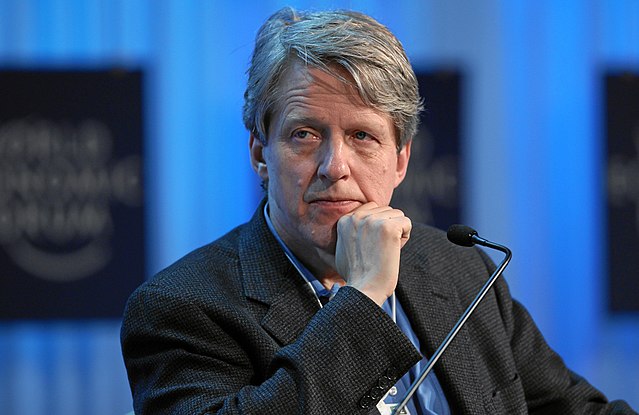One would only need to read a history book to know that alternative currency has been around for ages. Today, that alternative comes in the form of digital currency proliferating in the mainstream market.
This is the sentiment of Nobel Prize winner in economics Robert Shiller. Along with his colleague, Karl Case, the two created the Case-Shiller index that’s been integrated by Standard and Poor’s Financial Services in their system.
The decorated economist said that new currency seems to sprout whenever a society is yearning for some sort of revolution. He added that cryptocurrency is the result of such yearning and is also part of the recurring pattern seen in human economies. Shiller cited Josiah Warner’s “labor notes” in 1827 and the Technocracy movement, which aimed to develop a society base on energy.
Part of the allure of cryptocurrency, Shiller explained, is the mysterious air that shrouds it. This mysteriousness stems from the fact that only a few people deeply understand how it works. This, in turn, creates exclusivity for members of the ecosystem, as well as giving glamor to the new currency.
And these observations are spot on as evidenced by the recently concluded Consensus event. The air of exclusivity was thick among the 8,500 attendees even to the newly initiated who were drawn in by the crypto market partly because of the glamor that it possesses.
Another observation that Shiller pointed is that those who gravitate towards the new currency usually have varying sentiments about governments being the primary source of “war and inequality.” Mistrust, to put simply. And mistrust is rife among the crypto community, even within the members of its own fold.
But mistrust is also rampant outside the digital world of cryptocurrency. Bill Gates, Warren Buffet, and other business tycoons are denouncing this new technology. Of course, there are those who are also coming to its defense saying that we shouldn’t fear the application of it but rather understand how it can improve our society moving forward.



 Baidu Approves $5 Billion Share Buyback and Plans First-Ever Dividend in 2026
Baidu Approves $5 Billion Share Buyback and Plans First-Ever Dividend in 2026  SpaceX Seeks FCC Approval for Massive Solar-Powered Satellite Network to Support AI Data Centers
SpaceX Seeks FCC Approval for Massive Solar-Powered Satellite Network to Support AI Data Centers  Jensen Huang Urges Taiwan Suppliers to Boost AI Chip Production Amid Surging Demand
Jensen Huang Urges Taiwan Suppliers to Boost AI Chip Production Amid Surging Demand  Amazon Stock Rebounds After Earnings as $200B Capex Plan Sparks AI Spending Debate
Amazon Stock Rebounds After Earnings as $200B Capex Plan Sparks AI Spending Debate  Elon Musk’s Empire: SpaceX, Tesla, and xAI Merger Talks Spark Investor Debate
Elon Musk’s Empire: SpaceX, Tesla, and xAI Merger Talks Spark Investor Debate  Nvidia, ByteDance, and the U.S.-China AI Chip Standoff Over H200 Exports
Nvidia, ByteDance, and the U.S.-China AI Chip Standoff Over H200 Exports  Nintendo Shares Slide After Earnings Miss Raises Switch 2 Margin Concerns
Nintendo Shares Slide After Earnings Miss Raises Switch 2 Margin Concerns  Sony Q3 Profit Jumps on Gaming and Image Sensors, Full-Year Outlook Raised
Sony Q3 Profit Jumps on Gaming and Image Sensors, Full-Year Outlook Raised  OpenAI Expands Enterprise AI Strategy With Major Hiring Push Ahead of New Business Offering
OpenAI Expands Enterprise AI Strategy With Major Hiring Push Ahead of New Business Offering  Global PC Makers Eye Chinese Memory Chip Suppliers Amid Ongoing Supply Crunch
Global PC Makers Eye Chinese Memory Chip Suppliers Amid Ongoing Supply Crunch  SoftBank Shares Slide After Arm Earnings Miss Fuels Tech Stock Sell-Off
SoftBank Shares Slide After Arm Earnings Miss Fuels Tech Stock Sell-Off  TSMC Eyes 3nm Chip Production in Japan with $17 Billion Kumamoto Investment
TSMC Eyes 3nm Chip Production in Japan with $17 Billion Kumamoto Investment  Nvidia Nears $20 Billion OpenAI Investment as AI Funding Race Intensifies
Nvidia Nears $20 Billion OpenAI Investment as AI Funding Race Intensifies  Nvidia Confirms Major OpenAI Investment Amid AI Funding Race
Nvidia Confirms Major OpenAI Investment Amid AI Funding Race  Instagram Outage Disrupts Thousands of U.S. Users
Instagram Outage Disrupts Thousands of U.S. Users 
































